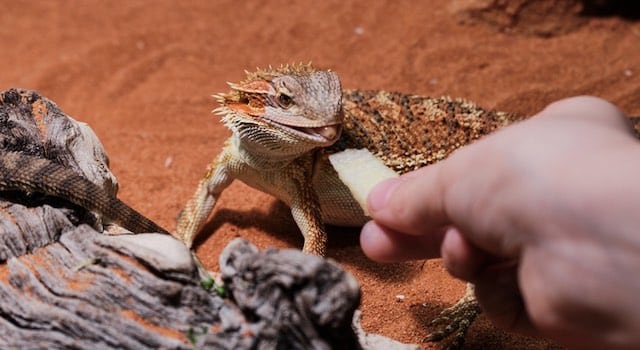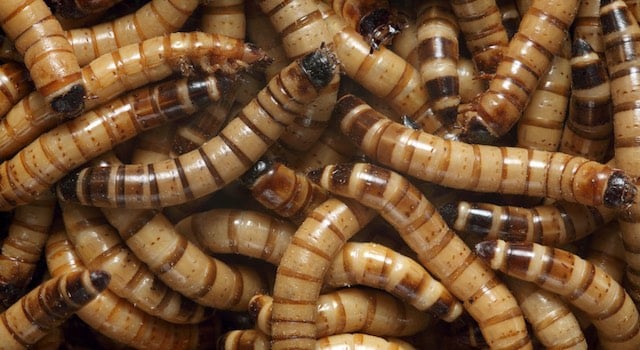
Introduction to Fruits Bearded Dragons Eat
Many new bearded dragon owners are often surprised to discover that these reptiles can eat fruit. Although fruit is not absolutely necessary in their diet, it does offer various health benefits that shouldn’t be ignored. Fruits are packed with important vitamins, minerals, and antioxidants that are good for bearded dragons and keep them healthy. Plus, most bearded dragons love fruit because it’s tasty and encourages a healthy appetite. If you are unsure what fruits bearded dragons eat, this article will guide you to safe and nutritious choices.
Nutritional Needs of Bearded Dragons
Bearded dragons should get essential nutrients like fiber, protein, vitamins, and minerals from a combination of different vegetables and feeder insects. Fruits are optional to include in a bearded dragon’s diet, but many experts recommend including them to make up for any nutrients that might be lacking from their main diet.
According to PetMD, fruits should not comprise more than 5% of the diet. Fruits should be fed sparingly because they are high in natural sugars and water, which can lead to digestive issues and diarrhea when fed excessively.
Adult bearded dragons can eat more fruits than hatchlings or juveniles because they are omnivores. Hatchlings and juveniles lean more towards being insectivores and require more protein and fat in their diet for growth, which should come from insects and vegetables.
Safe and Recommended Fruits Bearded Dragons Eat
Here’s a list of safe and recommended fruits for bearded dragons that are a rich source of fiber, antioxidants, and vitamins B and C. These fruits can be fed as a treat alongside vegetables and insects, which should form the majority of your bearded dragon’s diet.
- Apples
- Strawberries
- Blueberries
- Mangoes
- Banana
- Papaya
- Guava
- Dates
- Raspberries
- Melon
- Prickly pears
- Blackberries
- Peaches
- Grapes
- Figs
- Honeydew
- Cherries
- Pears
- Dragon fruit
- Apricots
- Kiwi
Other than helping to prevent nutritional deficiencies, fruits contain antioxidants that fight free radicals and support important body functions, like eyesight and shedding, and strengthen the immune system. They are also high in water, which is essential for hydration.
It’s recommended to feed more fruits with a balanced calcium to phosphorus ratio to maintain healthy bones and muscle function in bearded dragons. The ideal ratio is 2:1, meaning two parts of calcium are needed for every one part of phosphorus consumed. Most fruits don’t meet this exact ratio, but they should still contain slightly more calcium than phosphorus to be safe for bearded dragons.
Nutritional Value of Common Fruits Bearded Dragons Eat
Apples
Apples are noticeably high in vitamins A and C for vision and gut health. They also offer immune-boosting benefits, which are important for fighting off infections and recovering from existing health issues. Apples are an excellent source of dietary fiber and carbohydrates, which support healthy digestion and regulate bowel movements. Carbohydrates give bearded dragons energy and help them stay full for longer between meals.
Bananas
Bananas are very nutritious and offer numerous health benefits for bearded dragons. It’s rich in iron, magnesium, potassium, and calcium, which are important minerals that strengthen bones and support healthy nerves and muscles. Furthermore, these yellow fruits are packed with antioxidants that are known to reduce inflammation and improve kidney function.
The only downside to bananas is that they contain more phosphorus than calcium, with an imbalanced ratio of 0.2:1. This is why bananas should be fed in moderation, ideally no more than three times per month.
Strawberries
Very few bearded dragons will turn their noses to strawberries, which are sweet, tasty, and nutritious. Strawberries contain high amounts of vitamin C, potassium, fiber, calcium, and phosphorus. They are also high in water at about 45 – 68%, which promotes hydration and improves kidney function. However, watery fruits like strawberries can upset a bearded dragon’s stomach and cause diarrhea when fed in large quantities.
Blueberries
Blueberries are one of the most nutritious fruits for bearded dragons. They are packed with important antioxidants, manganese, and vitamins C and K. Vitamin K aids in bone metabolism because it produces proteins that help strengthen bones. It’s also essential for proper blood clotting, which helps wounds heal effectively. Blueberries are great for digestion because of their high fiber content. In fact, most of blueberries carbohydrate content comes in the form of fiber.
Balancing Fruits Bearded Dragons Eat with Other Food Groups
- Hatchlings (0 – 4 Months): 80% Insects and 20% vegetables.
- Juveniles (4 – 12 Months): 70% Insects and 30% fruits and vegetables.
- Adults (12+ Months): 50% Insects and 50% fruits and vegetables.
Fruit doesn’t need to be offered as a staple food source for bearded dragons but rather as a tasty, nutritious treat instead. It can be incorporated into a balanced diet, which should consist of various insects and vegetables. Fruit doesn’t contain the same key nutrients as leafy green vegetables like dandelion greens, kale, and mustard greens. It doesn’t provide nearly enough protein as feeder insects do, which should be your bearded dragons’ main source of protein.
Hatchlings and juvenile bearded dragons are insectivores and need a lot of insects in their diet, such as dubia roaches and crickets. They need the protein, fat, and fiber from insects to grow properly and develop healthy bones and muscles. However, they still need to eat vegetables for additional nutrients like fiber and essential vitamins and minerals.
It’s not recommended to feed fruit to hatchling bearded dragons because of the excess sugar and water. This can cause gastrointestinal and gut-related issues like diarrhea and stomach cramps. They are not able to digest fruits as well as juveniles and adults.
As bearded dragons mature, their metabolism changes and adapts to a more omnivorous diet, making it safe to offer fruit as a treat in moderation.
How to Introduce Fruits to Bearded Dragons
Fruit should be gradually introduced into a bearded dragon’s diet to avoid upsetting their stomachs. They need time to adjust to fruits’ high sugar and water content. You can start introducing fruit once your bearded dragon is at least 4 months old. This is around the same time they should be eating more plant-based foods in their diet in addition to live insects.
- Wash fruits thoroughly: All fruits must be thoroughly washed to remove dirt, debris, pesticides, and any pests.
- Removing peels, pits, and seeds: Bearded dragons should not eat the fruit peel, seeds, or pits. These should be removed prior to feeding. These parts of the fruit are also a choking risk. Plus, some seeds contain traces of cyanide, which is dangerous to ingest.
- Chopping into bite-sized pieces: Fruits should never be fed whole but rather chipped into bite-sized pieces instead. Bearded dragons should only eat one to three small pieces of fruit smaller than the space between their eyes. Even blueberries and grapes should be cut in half to make them easier to eat.
- Mixing with other foods: You can encourage your bearded dragon to eat fruit by mixing it with vegetables. Fruit makes a tasty topping for their daily salad of fresh leafy greens.
- Switching between different fruits: Feeding different types of fruits throughout the month is ideal for optimal nutrition and adds variety to their diet.
Potential Risks and Considerations with Fruits Bearded Dragons Eat
High Sugar and Water Content
Fruits are naturally high in water and sugar, which gives them a low nutritional profile compared to vegetables. Natural sugars like fructose and glucose are difficult for bearded dragons to digest, leading to health issues like bloating and diarrhea. The high water content might be good for hydration, but overfeeding watery fruits can cause diarrhea.
Intestinal Blockages
Bearded dragons can choke or suffer intestinal blockages from eating seeds and pits from fruits. They are not able to properly digest these parts of fruits, hence why they should be removed.
Avoid Unsafe Fruits
Bearded dragons should never eat citrus or very acidic fruits because they can cause digestive issues.
- Citrus fruits (oranges, lemons, limes, grapefruit, and tangerines)
- Pineapples
- Tomatoes
- Avocado
Health Benefits of Including Fruits in a Bearded Dragons Diet
The high water content in fruit is good for hydration, which bearded dragons need to stay healthy and active. They should still have access to a fresh water source in their enclosure to drink from when they get thirsty.
Fruit contains vitamins and minerals that replenish electrolytes in the body, which maintain fluid balance and hydration. All types of fruits have at least one electrolyte, but bananas, watermelon, and kiwis are a rich source. Sodium, calcium, magnesium, and potassium are important electrolytes that bearded dragons get from eating fruits.
Another benefit is that fruits are high in vitamins A and C, which help to strengthen the immune system and improve a bearded dragon’s overall well-being.
Monitoring and Adjusting a Bearded Dragon Diet
Fruit should be fed in moderation alongside the main diet of vegetables and feeder insects. Bearded dragons should ideally eat small quantities of fruit as a treat once or twice a week.
It’s important to look out for signs that you are overfeeding fruit to your bearded dragon and need to adjust their diet. Loose stools, reduced appetite, and enlargement of the fat pads on your bearded dragon’s body are common signs of overfeeding. If this is the case, try to cut back on the amount of fruit your bearded dragon eats and replace it with nutritious vegetables instead.
FAQs About Fruits Bearded Dragons Eat
What fruits are toxic to bearded dragons?
Citrus and highly acidic fruits should be avoided because they can disrupt your bearded dragon’s digestive system. This includes oranges, lemons, limes, tomatoes, and pineapple. Avocado is also a toxic fruit that is unsafe for bearded dragons because it contains persin, a type of fungicide toxin.
What fruits do bearded dragons like most?
Bearded dragons love any sweet and juicy fruits like apples, strawberries, watermelon, and raspberries. These fruits are safe to feed in moderation as part of a healthy, balanced diet.
Conclusion
It’s better to feed fruit as a treat in moderation because they are high in dietary sugar and water, which can upset a bearded dragon’s stomach. There’s no harm in offering fruit to make up for any nutrients that might be lacking from their main diet of vegetables and live insects. Bearded dragons can benefit from small amounts of fruit for hydration, electrolyte balance, and the numerous vitamins and minerals they need to be healthy.



